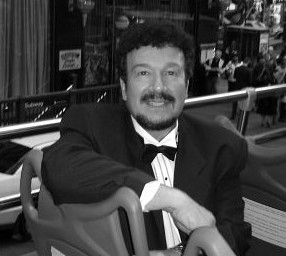
Critic Spotlight: October 2021
Thomas Gentile
New York
Primary Outlet: El Conocedor

Thomás Gentile is a member of the American Theatre Critics Association, Outer Critics Circle, and Drama Desk. Winner of an ECAS Award for educating Hispanics in the arts. El Conocedor provides reviews in Spanish of Broadway, Off Broadway, and more.
“De hoy en adelante, la pluma del Conocedor los llevará a teatros grandiosos, lugare exóticos, restaurantes exquisitos, eventos de interés cultural y turístico…todo si tener que dejar la pantalla de su computadora. A través de su pluma, viajamos a una variedad de países mientras gozamos de la diversidad étnica que se saborea en la comida, el cine, el teatro y la música. ¿Quién es el Conocedor? ¡Lea su página y lo conocerá!”
How did you get into theater criticism?
In 1996, I attended a Latino Film Fest in Providence, RI. At that time I was teaching the upper levels of High School Spanish — Spanish IV, Spanish V AP Spanish Language, and Spanish V AP Spanish Literature at Classical High School, a public prep school. I had always wanted to do something innovative for the native speakers of Spanish who were usually placed in regular Spanish 1, so I devised a course for hispanoparlantes concentrating on their strengths and weaknesses in the language.
The editor of a Spanish language weekly called “Shoreline en español” asked me to write for his paper. At first I reported stories of local interest and then shows at the Providence Performing Arts Center, then theater in Boston, New London, and New York. I am a member of the American Theatre Critics Association, International Theatre Critics’ Association, and the Outer Critics Circle which I served 10 years on the Executive Board. My purpose has always been to attract more Latinos to the theater by educating them in offerings available to them, and to not be intimidated by an activity that they enjoy in their own home country.
If you weren’t a theater critic, is there another area of the field that interests you?
I have also reviewed ballet and opera, and attended international festivals such as the Passion Play at Oberammergau, the reenactment of The Pied Piper in the town of Hamelin, and Water Puppetry in Vietnam, all to educate and stimulate the interest of my readers. If I weren’t a theater critic, I would work for one of the publicity firms that handle Broadway and Off Broadway shows, if I could handle the stress. Although press reps have many duties and their work is often under-appreciated, they are an important part of the business of theater.
What is your favorite type of performance to review/critique?
I love musicals and they are my favorite productions to review. Whether a flashy production in a big Broadway theater or a bare bones offering at one of the many Off Broadway venues, musicals offer a rich palette of emotions and aspects to admire, critique, and consider.
What is your history with the Spanish language and how did you decide that you wanted to write your theater criticism in Spanish?
Spanish is not my primary language. I am Italian American, spoke English at home, studied French in high school, and majored in French and minored in Spanish in college. After graduation, I created the Spanish department at my high school. That first year, I taught five classes of elementary Spanish. I took intensive classes in theater and fine arts at the National Autonomous University of Mexico in Mexico City during three successive summers. At the Iteso Institute in Guadalajara, Mexico, I concentrated on grammar and linguistics. I now have native language fluency in Spanish; and speak, read, and write French, Italian, and Brazilian Portuguese.
The ATCA EDI committee is now the BEID committee — Belonging, Equity, Inclusion & Diversity. What would you like to see from the BEID committee for the future of diverse theater critics?
Writing my reviews in Spanish was a way of finding my entry to theater criticism. There are many critics who write in English in this country but very few who write in another language. My target audience was untapped. In my reviews, I evaluate the many aspects of the play and explain the plot. For example, I advise on aspects to look for in the problematic language of Shakespeare’s plays.
I try to make the theater-going experience as pleasant as possible for speakers of Spanish. I attempt to create a safe zone for first time theater goers, a place where language need not be a barrier for enjoyment.
Belonging is a key word for me. Audiences must be made more diverse by a concerted effort to attract and include people of different backgrounds, race, ethnicity, walks of life. A critic who addresses an audience in their own language is doing a service to that community and to the theater as well.
What advice do you have for up and coming diverse theater critics?
Find an appropriate target audience, use your own rich background to flavor your writing, and draw from your life experiences to validate your opinions.
Recent Pieces
– Interview by Samantha Baird. Edited for length and clarity.





Sorry, the comment form is closed at this time.